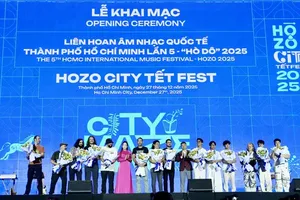
The rapid evolution of technology and the digital space has unlocked a treasure chest of opportunities for content creation and distribution. However, this progress has simultaneously unleashed a formidable foe – the challenge of effective copyright protection.
Deputy Director Pham Thi Kim Oanh of the Copyright Office of Vietnam (COV) observed that infringers readily derive illicit gains from the unauthorized uploading, reproduction, and distribution of intellectual property, creating enforcement difficulties within national jurisdictions.
A key obstacle is the inherently borderless nature of copyright infringement. Digital platforms facilitate the rapid and geographically unbounded dissemination of illicit content. Even after enforcement efforts, replica websites with alternate domain names frequently sprout, perpetuating a seemingly endless cycle of piracy.
The case of phimmoi.com, despite repeated blocking attempts, exemplifies this, with numerous variants such as phimmoiiii.com, phimmoicill, and phimmoizzz continuing to emerge.
Further complicating matters is the frequent disconnect between the rapid pace of technological evolution and the relative sluggishness of legal frameworks. E-commerce platforms, acting as intermediaries, often lack clearly defined responsibilities regarding copyright infringement.
Moreover, copyright identification and protection tools are not yet widely deployed in Vietnam, resulting in the open sale and sharing of infringing material without adequate monitoring or timely removal mechanisms.
Copyright infringement obviously not only diminishes the value of intellectual property but also severely impedes the growth of the creative economy, which is uniquely reliant on innovation and creativity to generate value. When creative works are infringed, the resulting revenue losses for creators and businesses stifle investment in new projects.
The film industry is particularly vulnerable, experiencing substantial declines in box office revenue, leading to significant financial losses for producers and dampening incentives for future investment.
The recent release of ‘Rom’ was immediately followed by the emergence of pirated versions, while ‘Co Ba Sai Gon’ was illegally livestreamed during its theatrical run. At the ‘Mai’ film premiere in early 2024, director Tran Thanh implored audiences to support Vietnamese cinema by refraining from illicit recording, spoilers, and piracy.
The publishing sector also suffers significant losses from the proliferation of pirated books sold cheaply on e-commerce platforms, eroding publishers' revenue and diminishing their capacity to reinvest in valuable works.
Similarly, the music and digital arts sectors are severely impacted by the unauthorized sharing of content on platforms like YouTube and unlicensed music streaming websites.
Beyond the impact on individual creators and businesses, copyright infringement inflicts significant damage on the national economy. According to the Institute for Policy Studies and Media Development (IPS), such infringement reduces government tax revenue due to the unchecked nature of illegal commercial activities. Furthermore, it undermines Vietnam’s competitiveness in the creative economy, particularly in the context of international integration and the rise of digital economies.
Public awareness and engagement are crucial in cultivating a culture of copyright respect. Raising awareness of copyright value through public information campaigns is essential to promote the consumption of legitimate intellectual property. Simultaneously, businesses, especially digital platforms, must demonstrate corporate social responsibility in upholding copyright, mitigating legal risks and fostering trust with users and creators alike.
























